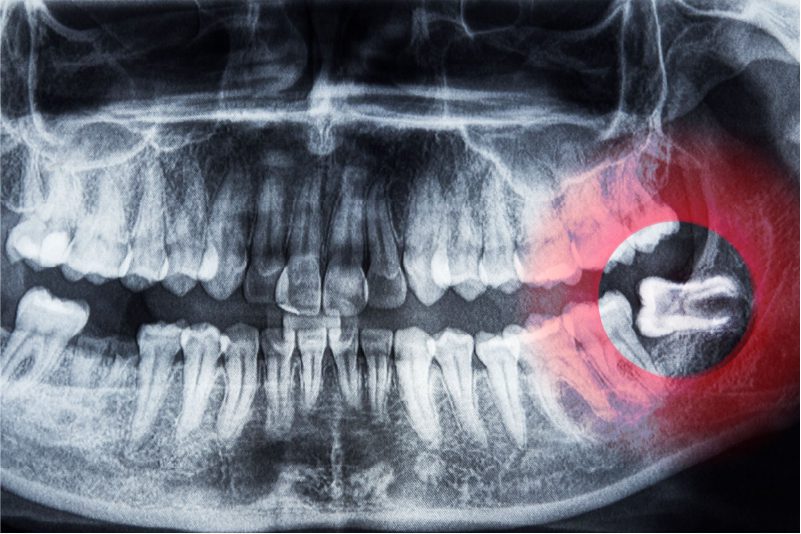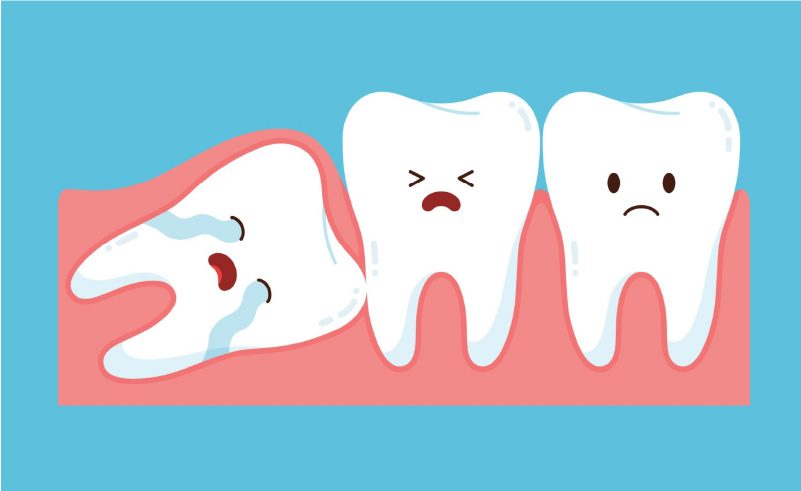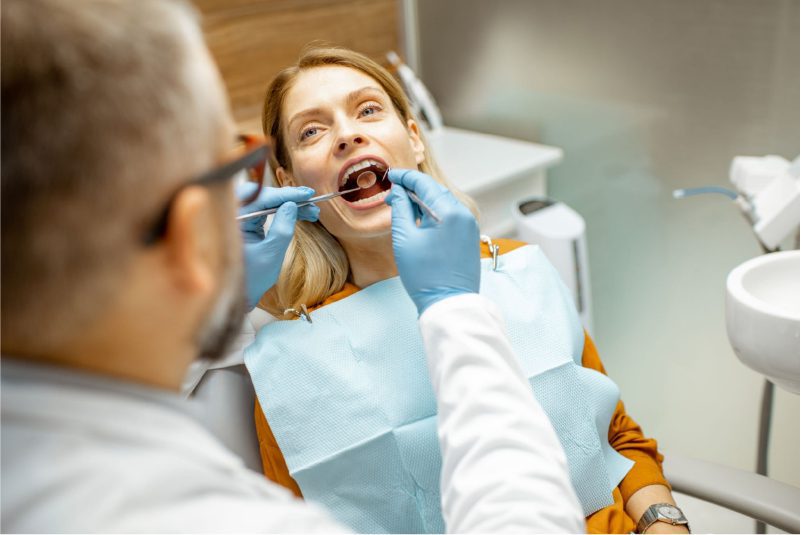Table of Contents Show
Wisdom teeth are the last set of molars that usually erupt in your late teens or early twenties. They are also known as third molars, because they are located behind the second molars in your mouth.
Some people never develop wisdom teeth, while others have one, two, three, or four of them. Some people have enough room in their jaws to accommodate their wisdom teeth, while others experience problems such as impaction, infection, decay, or damage to neighboring teeth.
So, should you get your wisdom teeth removed? The answer is not always straightforward. It depends on several factors, such as the position, size, shape, and health of your wisdom teeth, as well as your personal preferences and goals.
In this article, we will explain everything you need to know about wisdom teeth removal, including:
- The pros and cons of keeping or extracting your wisdom teeth
- The signs and symptoms that indicate you may need wisdom teeth removal
- The risks and complications of wisdom teeth removal
- The procedure and recovery of wisdom teeth removal
- The cost and insurance coverage of wisdom teeth removal
- The frequently asked questions about wisdom teeth removal
By the end of this article, you will have a clear understanding of the benefits and drawbacks of wisdom teeth removal, and you will be able to make an informed decision that suits your needs and expectations.
The Pros and Cons of Wisdom Teeth Removal


The first step to decide whether you should get your wisdom teeth removed is to weigh the pros and cons of keeping or extracting them.
Here are some of the advantages and disadvantages of each option:
Keeping Your Wisdom Teeth
Pros:
- You can avoid the pain, discomfort, and expense of surgery
- You can preserve your natural teeth and avoid potential bone loss or nerve damage
- You can use your wisdom teeth for chewing and biting if they are functional and healthy
- You can avoid the risk of dry socket, infection, bleeding, or other complications that may occur after extraction
Cons:
- You may experience pain, swelling, inflammation, or infection if your wisdom teeth are impacted or partially erupted
- You may develop tooth decay, gum disease, cysts, tumors, or damage to adjacent teeth if your wisdom teeth are hard to clean or misaligned
- You may have difficulty with orthodontic treatment or bite alignment if your wisdom teeth cause crowding or shifting of your other teeth
- You may need more complex and costly surgery in the future if your wisdom teeth become symptomatic or problematic later in life
Extracting Your Wisdom Teeth
Pros:
- You can prevent or resolve the problems caused by impacted, infected, decayed, or misaligned wisdom teeth
- You can improve your oral hygiene and dental health by eliminating the hard-to-reach areas where bacteria and plaque can accumulate
- You can enhance your smile and bite by avoiding the crowding or shifting of your other teeth
- You can save time and money by avoiding future dental issues or treatments related to your wisdom teeth
Cons:
- You may experience pain, discomfort, swelling, bruising, or bleeding after the surgery
- You may develop dry socket, infection, nerve damage, sinus problems, or other complications during or after the surgery
- You may lose some bone or gum tissue around the extraction site
- You may need additional procedures such as bone grafting or implant placement if you want to replace your missing teeth
As you can see, there are pros and cons for both keeping and extracting your wisdom teeth. The best option for you depends on your individual situation and goals.
To help you make the right decision, you should consult with your dentist or oral surgeon. They will examine your mouth, take X-rays or scans of your jaws and teeth, and evaluate the condition and position of your wisdom teeth.
They will also discuss with you the benefits and risks of each option, as well as the alternatives and expectations of the procedure. They will answer any questions you may have and provide you with a personalized treatment plan that suits your needs.
The Signs and Symptoms That Indicate You May Need Wisdom Teeth Removal


How do you know if you need wisdom teeth removal? Sometimes, it is obvious that your wisdom teeth are causing problems. Other times, it is not so clear.
Here are some of the common signs and symptoms that indicate you may need wisdom teeth removal:
- Pain or tenderness in the back of your mouth or jaw
- Swelling or redness around the gums of your wisdom teeth
- Difficulty opening your mouth or chewing food
- Bad breath or unpleasant taste in your mouth
- Pus or blood coming from the gums of your wisdom teeth
- Headaches or earaches caused by pressure from your wisdom teeth
- Crowding or shifting of your other teeth due to lack of space for your wisdom teeth
If you experience any of these signs or symptoms, you should see your dentist or oral surgeon as soon as possible. They will diagnose the cause of your problem and recommend the best course of action.
Sometimes, you may not have any signs or symptoms, but your dentist or oral surgeon may still suggest wisdom teeth removal. This is because some wisdom teeth may be asymptomatic, but still pose a potential risk for future problems.
For example, your wisdom teeth may be impacted, meaning they are trapped under the gums or bone and cannot erupt properly. Impacted wisdom teeth can cause damage to the surrounding structures, such as the roots of adjacent teeth, the nerves, or the sinuses.
Or, your wisdom teeth may be partially erupted, meaning they have broken through the gums but are not fully visible. Partially erupted wisdom teeth can create pockets where food and bacteria can get trapped and cause infection or decay.
In these cases, your dentist or oral surgeon may recommend preventive wisdom teeth removal to avoid complications later on.
The Risks and Complications of Wisdom Teeth Removal


Wisdom teeth removal is a common and safe procedure that is performed by millions of people every year. However, like any surgery, it has some risks and complications that you should be aware of.
Here are some of the possible risks and complications of wisdom teeth removal:
- Dry socket: This is a condition where the blood clot that forms in the socket after extraction becomes dislodged or dissolved, exposing the underlying bone and nerve. Dry socket can cause severe pain, bad odor, and delayed healing. It usually occurs within a few days after surgery and affects about 5% of patients. Dry socket can be prevented by avoiding smoking, drinking through a straw, spitting, or rinsing vigorously after surgery. It can be treated by cleaning the socket and placing a medicated dressing to relieve pain and promote healing.
- Infection: This is a condition where bacteria enter the wound and cause inflammation, pus, fever, or swelling. Infection can occur during or after surgery and affects about 1% of patients. Infection can be prevented by maintaining good oral hygiene, taking antibiotics as prescribed, and following the post-operative instructions. It can be treated by draining the pus and taking more antibiotics.
- Nerve damage: This is a condition where the nerves that supply sensation to the lower lip, chin, tongue, or teeth are injured during surgery. Nerve damage can cause numbness, tingling, pain, or altered taste in the affected area. It usually occurs when the wisdom teeth are close to the nerve or when there is excessive force or trauma during extraction. Nerve damage affects about 1% of patients and is usually temporary, lasting from a few days to a few months. In rare cases, it can be permanent and require further treatment.
- Sinus problems: This is a condition where the sinuses that are located above the upper wisdom teeth are affected during surgery. Sinus problems can cause bleeding from the nose, nasal congestion, or sinus infection. They usually occur when the roots of the upper wisdom teeth are long or curved and penetrate into the sinus cavity. Sinus problems affect about 0.5% of patients and are usually mild and self-limiting. In some cases, they may require further treatment such as sinus irrigation or surgery.
- Bleeding: This is a condition where there is excessive or prolonged bleeding from the extraction site. Bleeding can occur during or after surgery and affects about 0.5% of patients. Bleeding can be prevented by applying pressure with gauze or a tea bag on the wound for at least 30 minutes after surgery. It can be treated by applying more pressure, using ice packs, elevating the head, or taking hemostatic agents.
- Other complications: These include allergic reactions to anesthesia or medications, damage to adjacent teeth or fillings, jaw fracture, jaw stiffness, difficulty swallowing or breathing, nausea or vomiting.
These risks and complications are rare and usually minor and treatable. However, if you experience any severe or persistent symptoms after surgery, you should contact your dentist or oral surgeon immediately.
The Procedure and Recovery of Wisdom Teeth Removal


Wisdom teeth removal is usually performed as an outpatient procedure under local anesthesia (numbing), sedation (relaxing), or general anesthesia (sleeping). The type of anesthesia you choose depends on your preference, health condition, and complexity of the surgery.
The procedure typically takes about an hour to complete and involves the following steps:
- Your dentist or oral surgeon will make an incision in your gum to expose the tooth and bone
- They will remove any bone that blocks access to the tooth root
- They will divide the tooth into sections if it’s easier to remove in pieces
- They will remove the tooth using forceps or surgical instruments
- They will clean the site of the removed tooth of any debris from the tooth or bone
- They will stitch the wound closed to promote healing (sometimes this is not necessary)
- They will place gauze over the wound to control bleeding
After the procedure, you will be taken to a recovery room where you will be monitored for any signs of complications or adverse reactions to anesthesia. You will also be given instructions on how to care for your mouth and what to expect during the recovery period.
The recovery period varies from person to person, depending on the number and difficulty of the extractions, the type of anesthesia used, and the individual healing response. However, here are some general guidelines and tips to help you recover faster and more comfortably:
- Rest for at least 24 hours after surgery and avoid any strenuous physical activity
- Apply ice packs to your cheeks for 15 minutes at a time, several times a day, to reduce swelling and pain
- Take painkillers and antibiotics as prescribed by your dentist or oral surgeon
- Eat soft foods and drink plenty of fluids, but avoid hot, spicy, or acidic foods and beverages
- Do not smoke, drink alcohol, or use a straw for at least a week after surgery, as these can interfere with healing and cause dry socket
- Brush your teeth gently, but avoid the extraction site for a few days
- Rinse your mouth with warm salt water after meals and before bed, starting from the second day after surgery
- Avoid touching or poking the wound with your tongue or fingers
- Follow up with your dentist or oral surgeon as scheduled
Most people recover fully within a week or two after wisdom teeth removal. However, if you have any questions or concerns, or if you notice any signs of infection, bleeding, nerve damage, or sinus problems, you should contact your dentist or oral surgeon right away.
The Cost and Insurance Coverage of Wisdom Teeth Removal


The cost of wisdom teeth removal depends on several factors, such as:
- The number and complexity of the extractions
- The type of anesthesia used
- The location and experience of the dentist or oral surgeon
- The type and extent of insurance coverage
According to the American Dental Association (ADA), the average cost of wisdom teeth removal ranges from $75 to $200 per tooth for a simple extraction, and from $225 to $600 per tooth for an impacted extraction. However, these are only estimates and may vary widely depending on your specific situation.
The insurance coverage of wisdom teeth removal also varies depending on your plan and provider. Some insurance plans may cover part or all of the cost of wisdom teeth removal, while others may not cover it at all. You should check with your insurance company before scheduling the procedure to find out what is covered and what is not.
Some factors that may affect your insurance coverage are:
- The medical necessity of the procedure: Some insurance plans may only cover wisdom teeth removal if it is deemed medically necessary by your dentist or oral surgeon. This means that your wisdom teeth are causing or likely to cause problems such as pain, infection, decay, damage, or crowding. If your wisdom teeth are asymptomatic and do not pose a risk for future problems, your insurance plan may not cover the procedure.
- The age limit of the procedure: Some insurance plans may only cover wisdom teeth removal up to a certain age limit, usually between 18 and 25 years old. This is because wisdom teeth removal is considered more preventive than corrective in younger patients. Your insurance plan may not cover the procedure if you are older than the age limit.
- The deductible and co-payment of the procedure: Some insurance plans may require you to pay a deductible (a fixed amount that you have to pay before the insurance kicks in) or a co-payment (a percentage of the cost that you have to pay after the insurance pays its share) for wisdom teeth removal. These amounts may vary depending on your plan and provider.
To avoid any surprises or disputes with your insurance company, you should get a written estimate from your dentist or oral surgeon before undergoing the procedure. You should also get a preauthorization from your insurance company to confirm that the procedure is covered and how much you have to pay out-of-pocket.
The Frequently Asked Questions About Wisdom Teeth Removal
Here are some of the frequently asked questions about wisdom teeth removal that you may have:
Q: When is the best time to get wisdom teeth removed?
A: There is no definitive answer to this question, as different people have different situations and preferences. However, some general factors that may influence your decision are:
- The development stage of your wisdom teeth: Wisdom teeth usually erupt between 17 and 25 years old, but they can also erupt earlier or later. The earlier you remove them, the easier and less complicated the procedure. Younger patients have softer bones and smaller roots than older patients. Also, younger patients heal faster and have fewer complications than older patients.
- The condition and position of your wisdom teeth: If your wisdom teeth are impacted, infected, decayed, misaligned, or causing problems with your other teeth or oral health, you should get them removed as soon as possible. This will prevent further damage and complications in the future. However, if your wisdom teeth are healthy, functional, and well-aligned, you may not need to get them removed at all. You should consult your dentist or oral surgeon to determine the best option.
- Your personal goals and expectations: If you want to avoid the pain, discomfort, and expense of wisdom teeth removal, you may choose to keep your wisdom teeth and monitor them regularly. However, if you want to prevent or resolve the potential problems caused by wisdom teeth, you may choose to get them removed and enjoy the benefits of a healthier and more comfortable mouth. You should weigh the pros and cons of each option and decide what is best for you.
Q: How long does it take to recover from wisdom teeth removal?
A: The recovery time from wisdom teeth removal varies from person to person, depending on the number and difficulty of the extractions, the type of anesthesia used, and the individual healing response. However, here are some general timelines and milestones that you can expect:
- The first 24 hours: This is the most critical period after surgery. You may experience some pain, swelling, bleeding, or bruising in your mouth and face. You should rest, apply ice packs, take painkillers and antibiotics, eat soft foods, and drink plenty of fluids. You should also avoid smoking, drinking alcohol, using a straw, spitting, or rinsing vigorously. You should change your gauze pads every few hours or as needed.
- The first week: This is the main healing period after surgery. You may still have some pain, swelling, or discomfort in your mouth and face. You should continue to take care of your mouth and follow the post-operative instructions. You should also gradually resume your normal activities and diet, but avoid any strenuous physical activity or hard or crunchy foods. You should brush your teeth gently, but avoid the extraction site for a few days. You should rinse your mouth with warm salt water after meals and before bed, starting from the second day after surgery.
- The second week: This is the final healing period after surgery. You should be feeling much better and have minimal pain, swelling, or discomfort in your mouth and face. You should be able to eat and drink normally and resume your regular oral hygiene routine. You should also follow up with your dentist or oral surgeon as scheduled.
Most people recover fully within a week or two after wisdom teeth removal. However, if you have any questions or concerns, or if you notice any signs of infection, bleeding, nerve damage, or sinus problems, you should contact your dentist or oral surgeon right away.
Q: What are the alternatives to wisdom teeth removal?
A: Wisdom teeth removal is not always necessary or recommended for everyone. Some people may have enough room in their jaws to accommodate their wisdom teeth without causing any problems. Some people may prefer to keep their natural teeth and avoid surgery.
If you are one of these people, you may consider some alternatives to wisdom teeth removal, such as:
- Monitoring: This involves regular dental check-ups and X-rays to keep an eye on your wisdom teeth and their impact on your oral health. Your dentist or oral surgeon will advise you on how often you need to visit them and what signs or symptoms to watch out for. If your wisdom teeth become problematic or symptomatic in the future, you may still need to get them removed.
- Cleaning: This involves maintaining good oral hygiene and cleaning your wisdom teeth thoroughly every day. You may need to use special tools such as floss holders, interdental brushes, or water flossers to reach the hard-to-clean areas around your wisdom teeth. You may also need to visit your dentist or hygienist more frequently for professional cleaning and scaling.
- Filling: This involves repairing any decayed or damaged wisdom teeth with dental fillings. This can help prevent further deterioration and infection of your wisdom teeth. However, filling may not be possible or effective if your wisdom teeth are severely decayed or inaccessible.
- Root canal: This involves removing the infected pulp (the soft tissue inside the tooth) and sealing the tooth with a crown or a filling. This can help save a badly infected or damaged wisdom tooth that would otherwise need to be extracted. However, a root canal may not be possible or successful if your wisdom tooth is severely impacted or inaccessible.
These alternatives may help you preserve your wisdom teeth and avoid surgery in some cases. However, they are not suitable or effective for everyone. You should consult with your dentist or oral surgeon to determine the best option for you.
Conclusion about Wisdom Teeth Removal
Wisdom teeth removal is a common dental procedure that involves extracting the last set of molars that usually erupt in your late teens or early twenties.
Wisdom teeth removal can have many benefits for your oral health and comfort, such as preventing or resolving problems such as impaction, infection, decay, damage, crowding, or shifting of your other teeth.
However, wisdom teeth removal can also have some drawbacks and risks, such as pain, discomfort, swelling, bleeding, or complications such as dry socket, infection, nerve damage, or sinus problems.
Therefore, the decision to get your wisdom teeth removed is not always easy. It depends on several factors, such as the condition and position of your wisdom teeth, your personal preferences and goals, and the advice of your dentist or oral surgeon.
In this article, we have provided you with a comprehensive guide to help you make the right decision. We have covered the pros and cons of keeping or extracting your wisdom teeth, the signs and symptoms that indicate you may need wisdom teeth removal, the risks and complications of wisdom teeth removal, the procedure and recovery of wisdom teeth removal, the cost and insurance coverage of wisdom teeth removal, and the frequently asked questions about wisdom teeth removal.
We hope that this article has been informative and helpful for you. If you have any questions or concerns, you should consult with your dentist or oral surgeon. They will examine your mouth, take X-rays or scans of your jaws and teeth, and evaluate the condition and position of your wisdom teeth. They will also discuss with you the benefits and risks of each option, as well as the alternatives and expectations of the procedure. They will answer any questions you may have and provide you with a personalized treatment plan that suits your needs.
Remember, wisdom teeth removal is a common and safe procedure that can improve your oral health and comfort. However, it is not a one-size-fits-all solution. You should make an informed decision that is best for you.





Comments 1
Comments are closed.